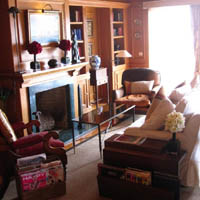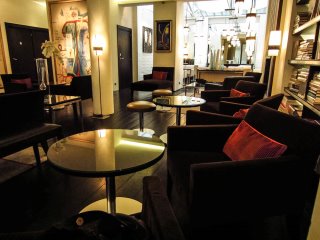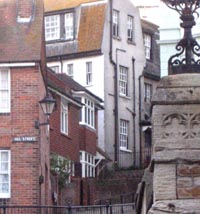The Crimson Garter is available at Amazon.com and at Kobobooks.
Stanley Moss is travel editor of Lucire. He has authored numerous books, including, recently, The Hacker.
Chapter 6
‘I always know when our Grace is supervising dinner, for I find her selection of food to be quite—exotic,’ Lady Dorothea announced. The first course had consisted of a flawless potato and leek soup. But Lady Dorothea seemed quite dissatisfied with it, informing the assembled company that she found it, ‘Far too rich and therefore it would disagree with my digestive system. Perhaps someone would like Cook to prepare a bowl of a more wholesome gruel?’
Pinckney shifted uncomfortably in his high-backed chair. ‘I tasted a very similar soup in the company of my esteemed friend, the Baron Schluysen-von Holstein, in Baden-Baden, and he pronounced it a most healthful dish,’ he attempted.
‘Do you prefer the Scottish or the Irish potato, Lord Humphrey?’ Dorothea Marsh said, ignoring his comment.
‘My dear Lady, I could not distinguish a difference between the two. However, I am sure I favour the Highland potato.’
‘Although the potato is a healthy root, it is nowhere as beneficial to the digestion as porridge,’ Lady Dorothea went on.
‘I have also partaken of a superior potato bouillabaisse in the company of my friend the Baron Schluysen-von Holstein in Paris,’ Pinckney chirped.
‘I do not care for Paris,’ Lady Dorothea sniffed. ‘And I sincerely believe that Paris should be left to the Parisians.’
‘Most surprising,’ Pinckney grumbled, as the conversation passed away.
The main course continued in almost complete silence. Finally Grazia entreated Pinckney to recount his experiences in Italy, for he had spoken of his wide travels earlier. He regaled the table with accounts of adventures in Rome and Napoli, but later recollected how uncommonly little laughter had resulted. ‘You and I seem to concur on our opinion of the Italian people,’ Pinckney then assured his hosts. ‘I regard them as flighty and vulgar, with their broad gestures and wide vowels.’
‘You have surely found the Scottish nation a welcome respite from continental types,’ Lady Dorothea said. ‘For we are a friendly people, down-to-earth, with a solid tradition of family, and a wholesome way of life.’
‘Yes, absolutely, madam,’ Pinckney breathed, relieved to have been granted a reprieve from extemporizing, and trying not choke on a stray bit of carrot which was struggling to enter his windpipe.
‘It is a privilege to grow up here, among the beautiful landscapes. The mist and fog in the morning, the smell of the heather.’ Lady Dorothea paused long enough to stare down her severe nose at her guest, who blinked his eyes eight times in rapid succession. Sir Robert moved a piece of potato to the side of his plate with his fork and pretended to find something highly interesting out the window, where darkness reigned. ‘There is no sound as joyous as the Scottish fiddle giving forth with a jolly jig, and it moves one to dance a lively step. It is simple pleasures like those which characterize Scotland,’ she went on. ‘We are not a materialistic people, and we suffer from only two vices. It is a fact that the Scots drink and smoke to excess.’
‘My dear Lady …,’ Pinckney began.
‘And then they fight.’ Lady Dorothea snapped. ‘A most disagreeable result, and one which should be purged from the nation. I have always felt a diet of less haggis and more porridge might reshape this disgusting attribute. But that, and certain tunes on the bagpipe aside, are the only objections one might have to living life here.
‘My late husband, Sir Henry Marsh, had only praise for the Highlands. He frequently expressed the opinion that he had no more use for London, much favouring the peace and tranquillity of our home.’ Here Lady Dorothea closed her eyes and travelled backward in time, and remembered the dashing young knight from London who was penniless, and adored her, and wooed her, and came to live with her at her family’s vast estate, and which she had later renamed in honour of him. She had surrendered the venerable Scottish name of Graham’s Moor for love. But that was years ago. She turned her attention back to Humphrey, Earl of Pinckney.
‘Now, sir, where do your travels take you, and when will you be venturing on to the next part of your journey?’
Sir Robert stood up suddenly. ‘Will you join me, Lord Humphrey, in my study for a drink and a smoke after dinner? I know in my heart that the presence of the Lady Grace tonight was due, in no small part, to your astute recommendation earlier this afternoon, that she partake of some sherry to bolster her blood.’
With a smug and self-satisfied grin, Humphrey, Earl of Pinckney took his leave of the table, but not without first theatrically kissing the hand of Grazia, and bowing his compliments formally to Lady Dorothea.
Once the men had exited the cavernous dining room, Grazia rose, intending to handle some matters of packing before retiring.
‘Just one moment, Grace,’ Lady Dorothea said, not looking up. ‘Please sit with me a bit longer.’
Grazia returned to her place and waited for whatever was forthcoming.
‘Robert informs me you will accompany him to London, a decision with which I greatly disagree. He appears intent on this, so I am compelled to speak to you before you go, in the interest that you are well-prepared for whatever you may encounter in your travels.’
‘Surely you do not anticipate some calamity will befall us?’ Grazia ventured.
‘When one departs the ancient grounds of Marshmoor and enters the wider world other forces come into play, my dear. You carry with you our honoured family name. Your upbringing—or perhaps your youth—ill-equip you to confront the harsher realities of life outside. You are far too trusting and the warm waters of your temperament will draw attention to you that does not befit the Lady of Marshmoor. Therefore, I offer the following advice to you.
‘Take only the soberest costumes or gowns, and keep your head covered at all times. Remember to always wear gloves. Maintain a dignified demeanour and do not engage in unnecessary chatter with secondary persons such as shopkeepers and the like. When walking about the streets, keep your head down and your eyes lowered. Averting your gaze is your greatest protection. It is unseemly to exhibit interest in your surroundings. Avoid theatrical gestures or any exaggerated behaviours. Remember that my son has business in London, and do not burden him with frivolous requests. He is already too indulgent of your whims.
‘Remember that the frugal wife is her husband’s greatest asset. London is filled with trinkets which may tempt you. Show strength of character by disdaining them for the worthless objects that they are. London is a den of brigands and pickpockets and thieves. An entire world of decadence and depravity could swallow you up in an instant. Trust Robert, for he is a man of the world. Obey him in all things and do not question his commands.
‘You are Lady Grace of Marshmoor now, and as such you must forsake your theatrical friends, and that dangerous life which my son so foolishly allowed you to pursue. I cannot and do not know what your conduct was in Paris. And I do not wish to. But I caution you that should you cause any embarrassment I shall hear of it, for I have many friends in London. And now, my dear, I wish you a most pleasant and safe journey. Cedric! Why have you not yet cleared the dessert plates! This is intolerable!’
Entering the dark sanctuary of Sir Robert’s study, Pinckney observed a miniscule fire burning in the cavernous grate. It cast deep shadows over the already thick gloom. Sir Robert ceremoniously unlocked a great cabinet, took out a crystal decanter, and judiciously poured a measured amount into two tiny crystal glasses.
‘In your honour, I wish to share with you the finest, rarest Scotch whisky, Wyckfyddre.’ He then quickly replaced the flask in the cabinet, as if the precious liquid might steal away of its own accord. Locating yet another tiny key, Sir Robert unlocked a smaller cabinet from which he produced a mahogany box, wherein six cigars resided in a precise row. ‘I beg you, sample one, although I confess a preference for the pipe.’
The two men arranged themselves in the worn leather chairs opposite each other. Sir Robert meticulously filled his briar pipe, lit it, and puffed until a cloud of smoke encircled his entire head. Pinckney squirmed about, trying to elude a persistent spring, which devilishly stuck him in the ribs each time he allowed himself to lean back. He was further vexed when even the small sips of Marsh’s cherished whisky, which he found to be excessively hard on the palate, did nothing to ameliorate the musty odour of what clearly was a cigar well past its prime. Finally, Pinckney gulped down the remaining fingerful of whisky, then sputtered ‘Very fine, Sir Robert. Very fine, indeed.’
During dinner, a scheme had formed in Sir Robert’s mind to deal with the bothersome problem of the scandalous painting named The Crimson Garter. When Pinckney mentioned his acquaintance with the Baron Schluysen-von Holstein it precipitated a solution—one which would both rid him of his pesky guest, as well as deliver into his hands the painting which had compromised poor Grace.
‘Lord Humphrey,’ he began. ‘It is obvious that you are a worldly man, and one readily observes that you possess the utmost discretion and ability. Perhaps you can lend me the favour of your assistance.’
Pinckney sat forward and regarded Sir Robert with his full attention. ‘There is something in Paris which I would like to acquire. Cost is no object, but my anonymity is imperative. I ask therefore that you locate and purchase it for me.’ Sir Robert went to his desk, removed the article received that morning from the Lady Dorothea, and handed it to Lord Humphrey. ‘Please read this.’
‘Ah! from Paris!’ Pinckney exclaimed. ‘Treadwell’s! Very reliable, not to mention occasionally scintillating!’ He quickly gave the article his full attention. The sum of Sir Robert’s conversation during his sojourn had largely concerned philosophical matters. Now Pinckney expected the article to bore him further with the sleep-inducing details of some tome or treatise. He barely disguised his surprise when the subject of the article turned out to concern a scandalous painting of the recently retired ballerina, Grazia Rosetti, known as La Fragolina. He instantly suspected the Scottish lord’s tastes more carnal than one presumed. Perhaps Sir Robert harboured, in an unknown portion of his manor house, a selection of provocative art and sensual literature. But it was when he came upon the name Grazia Rosetti that Lord Humphrey read on more carefully to the end. Too impossible to be true! ‘Sir!’ he blurted, ‘Can it be that La Fragolina is also Lady Grace Marsh?’
Marsh’s strained expression told Pinckney everything. Slowly he put his hand to his head in a gesture which he believed communicated distress, if not despair. He hoped that Lord Humphrey appreciated the sensitivity of the situation. ‘I am afraid you recognize all too well why this is a matter of the utmost urgency and delicacy,’ he said.
Pinckney leapt out of his chair, and walked to Sir Robert. He lay a hand on his host’s shoulder and Marsh cringed involuntarily at the overfamiliarity of the gesture. However, the reaction was lost on Pinckney, who nearly hopped about in delight at discovering such gossip and scandal in such an unexpected corner of the world. ‘I am entirely sympathetic, Sir Robert! And honoured by your trust. It is not misplaced. I shall do my utmost to assist you.’ Then, as an afterthought, he sputtered ‘Surely you do not suspect your wife—a most delicate—of indiscretion—Sir, I assure you—a chance she has been compromised?’
‘You misunderstand,’ said Marsh. ‘I have no knowledge of how this painting was accomplished. In fact, I prevail upon you to make discreet inquiries regarding it and the artist who has presumed to implicate my innocent wife. But I remind you, my name can in no way be connected with either the purchase or the inquiry. And nobody must learn of the connection between my wife and the theatre.’
‘Sir Robert, you may rely on me completely. I shall accomplish these tasks expeditiously. When would you like me to leave?’
‘Immediately,’ answered Marsh. ‘Surely you appreciate the urgency of this mission.’
‘Absolutely impossible,’ Pinckney told him. ‘I have a pressing matter in London, une affaire du cœur, if you understand my meaning, that will occupy me for a fortnight. After which, Sir, I will be honoured to be at your service.’
‘Then you still misunderstand my predicament, Lord Humphrey. I do not deign to employ the words life and death, but if you consider the desperate tone of such an allusion you will not refuse me. I will arrange the necessary bank drafts to enable you to travel comfortably and acquire the painting, and I ask you to inform me immediately as soon as this is accomplished. One other detail: my wife must know nothing of this, as it would only add to her anxiety and imperil her already delicate health. And you will not be seeing the Lady Grace again. Now let us seal our compact with another excellent whisky!’
Letter from Humphrey, Earl of Pinckney
To Amanda Pennington-Smythe
From Marshmoor, Scotland
My Dear Amanda,
I write in great haste. Sir Robert has entrusted me with a most delicate and pressing errand which cannot wait. My urgent mission requires that I immediately leave for the continent. Thus, I fear I am unable to accompany you in London to the début of the tenor, Tuccio Porciniditorta, as we planned. Should you gain an introduction to Signor P., I urge you to mention my good friend, the Baron Schluysen-von Holstein, his patron. I shall write you from my next destination, and I assure you, I am your most devoted servant—
Pinky
If you wish to read ahead, The Crimson Garter is available at Amazon.com and at Kobobooks.
Related articles hand-picked by our editors
 Off to London, Lisbon,
Livorno, Lille, Lahore
Off to London, Lisbon,
Livorno, Lille, Lahore
Travel editor Stanley Moss updates us on his wanderings, brought
to you by the letter L
photographed by the author
 Two Parisian hideaways
Two Parisian hideaways
Stanley Moss looks at two distinctive Parisian hotels on opposite sides of town, with very different characters
photographs by Paula Sweet and courtesy Hôtel Le A
 Rich in its memories
Rich in its memories
Stanley Moss takes in St Leonards-on-Sea, a charming seaside hamlet
in East Sussex rich in history
photographed by the author
Advertisement
Copyright ©1997–2022 by JY&A Media, part of Jack Yan & Associates. All rights reserved. JY&A terms and conditions and privacy policy apply to viewing this site. All prices in US dollars except where indicated. Contact us here.